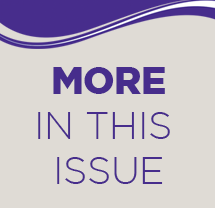Imagine witnessing the moment a parent sees their child for the first time after a life-changing surgery. They hold their child in their arms and look at the beautiful new smile made possible by surgeons who corrected a cleft lip or palate. A newfound sense of hope fills their heart.
That experience is one that Joanna Ehrlich ’13 is fortunate enough to witness on a regular basis through her work with Operation Smile. As an international program coordinator with the organization, she takes surgical missions from concept to execution – planning the details, working with local partners and other entities, coordinating logistics, and being the point-person on the ground to ensure everything is running safely and smoothly. But to be a part of that emotional moment when a parent sees their child for the first time post-surgery “is one of the most incredible experiences during a mission,” she says.
One of her favorite stories is about a six-month-old little girl in Paraguay named Geraldine. Her family had traveled from the furthest Western region of the Paraguayan Chaco, where their tribe lives, to reach the mission location. They arrived scared and pleading for help for Geraldine. Operation Smile was able to repair her cleft lip and a few months later, repaired her cleft palate during another mission. The second time around, her family was not scared, but filled with hope for what Operation Smile would be able to do for Geraldine. Their tribe no longer shunned them, but instead were united and hopeful over the situation. Before leaving the mission, Geraldine’s grandfather told them that they were “really sad before the surgery, and now, every day we have a reason to smile.”
As a public health major and nutrition minor while at Winona State, Ehrlich always dreamed of working for the CDC. She knew that it would take her a while to achieve that goal, so she has since worked to forge a path in her career to someday make that dream a reality.
After graduation, Ehrlich first worked as an intern for a corporate wellness company – but she says that it didn’t take her long to discover that her heart lies in the nonprofit sector. After her internship, she was offered an opportunity to run a program at the YMCA aimed at preventing the onset of diabetes, and later, worked for a well-known nonprofit working with underserved youth in some of the toughest Minneapolis communities to improve health outcomes.
She says that she loved the work that she was doing, but wanted to venture into the realm of global health to gain valuable experiences that would help shape her future. In July 2015, she started working for Operation Smile. “Right from the start, I knew that these were going to be some of the most incredible years of my life – filled with experiences I will never forget,” she says. “This role has challenged me in every way possible and put my education and skills to work in a very unique way.”
She says that this job has given her the opportunity to do something extremely rewarding with her degree while traveling the world. She has conducted missions in China, Bolivia, Mexico, Vietnam, Paraguay, and Brazil. Most recently she was working in the Philippines on a longer-term assignment as Operation Smile is celebrating its 35th anniversary there – where they held their first mission in 1982.
She says that the organization is based around a simple concept, frequently shared by the co-founder and CEO Dr. Bill Magee, that “love is making somebody else’s problem your problem.” Ehrlich says that in her travels, she has met some of the most incredible families and volunteers who constantly restore her faith in humanity. But at the heart of what Operation Smile does, and Ehrlich’s favorite part about the job, are the patients. “They are beautifully spirited and resilient, despite some of the hardships that they face in their communities,” she says. “They make this job so easy to love.”
Another of her most rewarding experiences was while on a mission in Vietnam when a 13-year-old boy came with his two sisters. He had an unprepared cleft palate, and was also completely deaf. His family had very little access to health services or education, and therefore he had never learned sign language or spoken a word in his life. Ehrlich had taken some sign language classes when she was young, and worked with him (through the help of an interpreter) the entire week leading up to his surgery to teach him some basic sign language. After his surgery, a small team from Operation Smile was at his bedside as he woke up from the anesthesia. He looked around with a huge smile on his face, and then signed “thank you.” Ehrlich says that it was at that moment that she knew Operation Smile had made a profound impact on that child’s life.
She credits her WSU education with helping to shape her into the public health professional she is today. “The HERS faculty did a tremendous job in taking our experiences beyond the classroom, which developed crucial public health skills that set us apart from other graduates,” Ehrlich says. “Many of our public health courses were intentionally structured to get us thinking critically beyond our bubble, significantly contributing to what we could take away from each class. I truly believe that without this exposure, I wouldn’t be where I am today.”
She says that she still dreams of working for the CDC some day, but for now is completely content with where she’s at. “We work extremely hard at Operation Smile to bring smiles to thousands of children around the world each year,” she says, “but the truth is that they give us so much more in return.”


